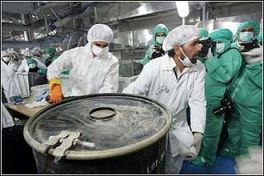
|
NEDERLANDS | ENGLISH
|
|
|
7 november 2011
|
 mail dit artikel
| mail dit artikel
|
 print
| print
|  
Dit artikel is deel van de serie: De komende oorlog tegen Iran
[ 1 - 2 - 3 - 4 - 5 - 6 - 7 - 8 - 9 - 10 - 11 - 12 - 13 - 14 - 15 - 16 - 17 - 18 - 19 - 20 - 21 - 22 - 23 - 24 - 25 - 26 - 27 - 28 - 29 - 30 - 31 - 32 - 33 - 34 - 35 - 36 - 37 - 38 - 39 - 40 - 41 - 42 - 43 - 44 - 45 ]
New steps on the road to a military conflict with Iran
By Daan de Wit
Translated by Ben Kearney The information war that is currently raging around Iran is part of the ongoing conflict with the country. It is one component of the preparations for war against Iran that have been underway for years, and which follow the template used to conquer Iraq. Other components of this conflict involve the sanctions, the test-firing of a long-range missile by Israel capable of carrying a nuclear payload and striking Iran, the sabotage carried out on Iranian territory, the cyber attacks, the military exercises over Sardinia and the attacks on Iranian nuclear experts. The attacks are most likely part of a 400 million dollar American program initiated under President Bush and continued under President Obama ‘for the expansion of covert operations in Iran intended to destabilize and overthrow the regime, possibly with the help of military intervention.’ Under Bush, a nonviolent solution to the 'Iran problem' was actively avoided. Instead, a course was laid for a military confrontation - a strategy that would not seem to have been relinquished by the Obama administration. The Teheran Times reporting in early November: 'Supreme Leader of the Islamic Revolution Ayatollah Seyyed Ali Khamenei has said that Iran has one hundred indisputable documents that prove the United States’ involvement in terrorist actions and assassination plots in Iran and the region and will release them to the public.' It remains to be seen whether this will make much of a difference. The war against Iran started a long time ago. A military conflict is merely one phase within this war, just as it was with Iraq.
Discussions about the Middle East are often couched in terms of stability. An example of this is top American military commander Mike Mullen, who before retiring expressed concern regarding a war against Iran on account of the instability that it would cause. With 'instability', Mullen is referring to a disruption of the existing balance of power. But this balance of power is already disproportionate: Israel is the only country in the Middle East that possesses a nuclear weapon. Were Iran to become a nuclear power as well, the balance of power would become less skewed. Both countries would at that point be in a position to annihilate one another, and as a result would think twice before doing such a thing. So it remains to be seen whether Mullen is right, or whether exactly the opposite will occur should Iran acquire a nuclear weapon. No matter what, a war against Iran will be a detriment to market balance and the price of oil. A war with Iran could have an extremely disruptive effect, especially in these unstable times.
____________________________________________________________________________
DeepJournal Meld je aan voor de gratis mailing list. |
 Debka File, a publication that gives voice to the Israeli military establishment,
Debka File, a publication that gives voice to the Israeli military establishment,